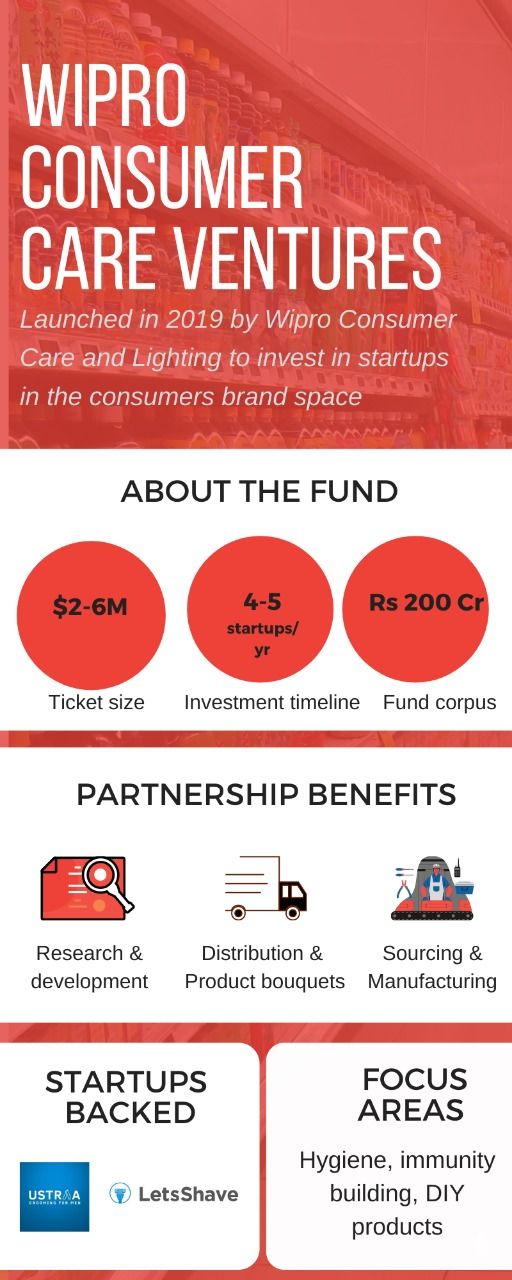The fast-moving consumer goods (FMCG) industry was one of the first to take a serious hit during the pandemic. But after the lockdown was lifted, the sector showed signs of improvement.
Market studies predict that consumption in India will remain intact in the long term. According to an EY India report, the country is expected to become the fifth-largest market for consumer products in the world by 2025, with a size of $262 billion.
There are many brands such as Mamaearth, Paper Boat, Veeba, Vilvah, Beardo, Bombay Shaving Company, Sattvik, Wow Skincare, Ustraa, LetsShave, etc., in the market. According to experts, established FMCG brands are increasingly looking to partner with startups in the ‘emerging’ consumer domains to stay relevant.
FMCG major Wipro Consumer Care, a unit of Wipro Enterprises Pvt Ltd, which launched a fund last year to grab a pie of growing new-age non-tech startups, has so far invested in two such startups, LetShave and Ustraa, and is now looking to invest in about five startups in this space. It is also looking to bet even more in this sector as the pandemic is a moment for startups in the FMCG segment.

Illustration by Tenzin Pema
In an interaction with YourStory, Sumit Keshan, Managing Partner for Wipro Consumer Care Ventures, says,
“There has been a wave of new-age companies, particularly in the last six years, that are innovative and challenging the existing norms. They have been able to scale up quickly due to their uniqueness. We are keen to invest in them, add value to them, as well as learn from them.”
Speaking about the fund, Sumit says Wipro Consumer Ventures was formally launched in 2019 to be a part of the growing startup ecosystem in the FMCG sector. He adds that the fund is in build phase as it has just two companies in its portfolio, but now it is looking to invest in at least four-five startups in the FMCG sector, with a focus on male grooming, feminine hygiene, immunity and wellness, and personal care.
Speaking about how Wipro shortlists startups, Sumit says that a company should have a unique or innovative approach. For instance, green products, services companies like B2B sales, etc.
“We are open to back companies through our deep domain expertise to assist in specific areas like creating newer channels of revenue, helping in tapping global sourcing opportunities, R&D, etc.,” Sumit adds. He says that Wipro’s starting point normally is to look at ventures which are unique, have great entrepreneurs behind them, and those which operate in a space that has a large potential to grow.
While there are no official figures on the amount invested by Wipro Care Ventures in LetsShave and Ustraa, Sumit says the typical ticket size of the investment is anywhere between $2-6 million.
Speaking about the two investee companies, he says that both are highly promising and are doing extremely well.
“What we saw in them was that they are young companies with very clear product differentiation and market strategy, run by highly knowledgeable and passionate promoters, and operate in large markets with the potential to scale,” says Sumit.
Founded in 2015 by Sidharth Oberoi, Chandigarh-based LetsShave sells razors, spare blades, shaving brushes, shaving foam, body scrubs, and travel bags. It claims to have a user base of over half-a-million with a repeat rate of over 40 percent, serving more than 18,000 pincodes in India.
Similarly, Delhi-based Happily Unmarried, which offers male grooming products under the brand Ustraa, is also a well-known startup that has garnered other investors such as Info Edge and IIFL Group.
Sumit says that collaboration of established FMCG brands will help these companies stay relevant, and will also help them to leverage established expertise of the evolved companies in this space.
“Given our domain expertise, we feel we can add value to the companies by helping them address some of their challenges like scaling their business, helping them create additional revenue and growth opportunities, helping them to be efficient, and so on,” says Sumit.
Moreover, he asserts that FMCG startups need to get their act right in a few areas – starting from making the right product, finding consumer preference fit, acquiring and retaining them, geographies to focus on, deciding on the type of marketing and spend profile, etc.
Pandemic, Pivot, and Persist
Sumit points out there is a visible impact as a change in the consumption profile. Channels like ecommerce have grown rapidly and consumers are preferring contactless services, and startups have to take cognisance of these while creating/altering their strategies. He advices startups to review, tweak, or pivot their strategy by taking cognisance of the current situation, looking at future trends, bringing profitability focus, conserving capital, raising capital, etc.
“In fact, I would say they have done great work in managing this in the last five-six months,” says Sumit.
Talking about the future trends, he says that technology as an enabler is getting prominence. Spotting the changing trends quickly and reaching out to consumers in convenient ways is going to be the key.
“Spot changes in consumer consumption early and put your money behind it,” says Sumit.
Edited by Megha Reddy
Want to make your startup journey smooth? YS Education brings a comprehensive Funding Course, where you also get a chance to pitch your business plan to top investors. Click here to know more.
Link : https://yourstory.com/2020/09/wipro-consumer-care-ventures-consumer-brands-market-share
Author :- Rashi Varshney ( )
September 16, 2020 at 05:40AM
YourStory
